Build a Solid Foundation with Medical Reference Letters: 21 Templates for Impactful Recommendations
Welcome to Medical Reference Letters, your comprehensive resource for all things related to reference letters in the medical field. Whether you are a student pursuing medical education, a healthcare professional seeking career advancements, or an employer evaluating candidates, references play a vital role in showcasing qualifications, character, and potential. Our website is designed to provide valuable insights, guidance, and writing tips to help you navigate the process effectively. Discover the importance of reference letters, learn how to request them professionally, and gain an understanding of the impact they can have on applications, admissions, employment opportunities, and professional growth. Explore our resources and empower yourself to craft impactful references or request them with confidence. Welcome to a world where words become catalysts for success in the dynamic realm of medicine.
Importance of Reference Letters
Reference letters play a crucial role in the medical field and can have a significant impact on various aspects of a person’s career. Here are some key reasons why reference letters are important in the medical field:
- Applications and Admissions: Reference letters are often required as part of applications for medical school, residency programs, and other advanced medical education. These provide insight into an applicant’s qualifications, character, and potential for success, helping admissions committees make informed decisions.
- Professional Reputation: Strong reference letters contribute to building a positive professional reputation. They serve as endorsements from respected individuals who can vouch for an individual’s abilities, work ethic, and professionalism. Positive references can enhance an individual’s credibility and reputation within the medical community.
- Employment Opportunities: Reference letters are frequently requested by employers when considering candidates for medical positions. These provide employers with valuable insights into an applicant’s clinical skills, interpersonal abilities, and overall suitability for the job. A well-written reference letter can give applicants a competitive edge and increase their chances of securing employment.
- Networking and Connections: Reference letters can help forge valuable connections within the medical field. Recommenders who hold influential positions or have extensive networks can provide introductions and recommendations to other professionals, opening doors to mentorship opportunities, collaborations, and further career advancements.
- Professional Growth: Reference can contribute to an individual’s professional growth and advancement. Positive letters can support applications for grants, fellowships, and research opportunities, showcasing an individual’s expertise and potential. They can also be used when seeking promotions, leadership positions, or academic appointments.
- Trust and Validation: Reference letters provide external validation of an individual’s skills, abilities, and character. They offer assurance to decision-makers, whether it’s admissions committees, employers, or colleagues, that the individual has the necessary qualities to succeed in their medical pursuits.
- Long-Term Impact: Reference can have a lasting impact on an individual’s career trajectory. Positive letters can be kept on file and referenced throughout an individual’s professional journey, serving as a testament to their abilities and achievements.
Writing Tips
When it comes to writing effective medical reference letters, here are some valuable tips and guidelines to consider:
- Maintain a Professional Tone: Keep the tone of the letter formal and professional throughout. Use polite and respectful language, and avoid any slang or casual expressions.
- Structure the Appropriately: Follow a clear and organized structure for the letter. Begin with a professional salutation and introduction, followed by well-structured paragraphs that highlight the applicant’s qualifications and strengths. Conclude with a concise summary and a strong recommendation.
- Be Specific and Detailed: Provide specific examples and details about the applicant’s skills, experiences, and achievements. Use concrete examples to illustrate their abilities and showcase their potential for success in the medical field.
- Focus on Relevant Information: Highlight the applicant’s qualifications and experiences that are directly relevant to the purpose of the letter. Tailor the content to the specific program, job, or opportunity the applicant is applying for.
- Include Contact Information: Include your contact information at the end of the letter, allowing the recipient to reach out to you if they have any further questions or need additional information.
- Proofread and Edit: Carefully proofread the letter to ensure it is free of spelling, grammar, and punctuation errors. Review the content for clarity, coherence, and flow. Edit as needed to enhance the overall quality of the letter.
- Use Strong and Positive Language: Choose words and phrases that convey a strong and positive impression of the applicant. Emphasize their unique qualities, skills, and accomplishments to make the letter impactful and memorable.
- Be Honest and Sincere: Provide an honest and sincere assessment of the applicant’s abilities and character. Avoid exaggerations or false information that may compromise the integrity of the letter.
- Maintain Confidentiality: Respect the applicant’s privacy by keeping the contents of the confidential. Do not share or disclose sensitive information without proper authorization.
- Follow Submission Guidelines: If there are specific submission guidelines or requirements for the letter, ensure that you adhere to them. Pay attention to deadlines and any specific formatting or submission instructions.
#1: Medical School Admission Recommendation
A letter of recommendation for medical school admission serves as a powerful endorsement of an applicant’s qualifications, character, and potential for success. It is typically written by a professor, employer, or mentor who can attest to the applicant’s academic achievements, commitment to medicine, and interpersonal skills. This provides valuable insights to the admissions committee, highlighting the applicant’s suitability for a career in medicine and reinforcing their dedication to becoming a competent and compassionate healthcare professional. Its purpose is to strengthen the applicant’s application, provide a compelling narrative, and support their candidacy by showcasing their abilities, achievements, and potential for future success.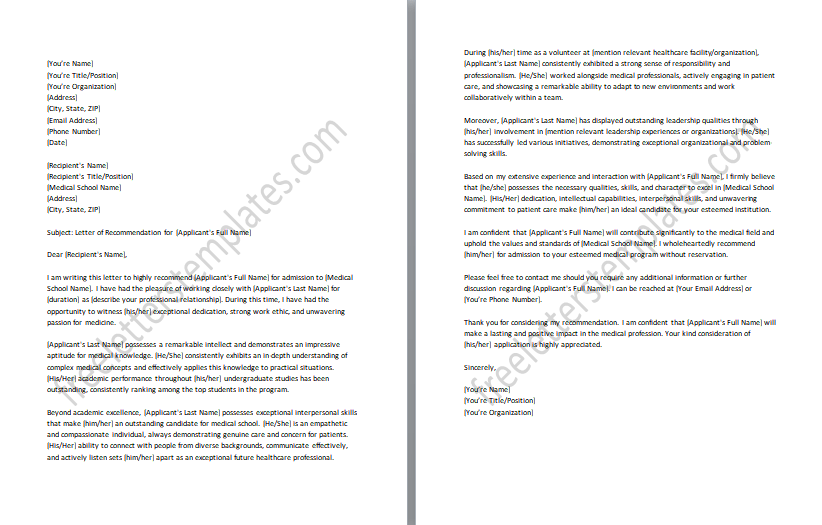
#2: Residency Program Application Endorsement
An endorsement letter for a residency program application serves as a strong recommendation and support for an applicant’s suitability for their desired residency program. Typically written by a supervisor, mentor, or faculty member who has closely worked with the applicant, this highlights the applicant’s clinical skills, professionalism, dedication, and potential for growth in their chosen specialty. It aims to strengthen the applicant’s application, validate their qualifications, and enhance their chances of being selected for the desired residency program.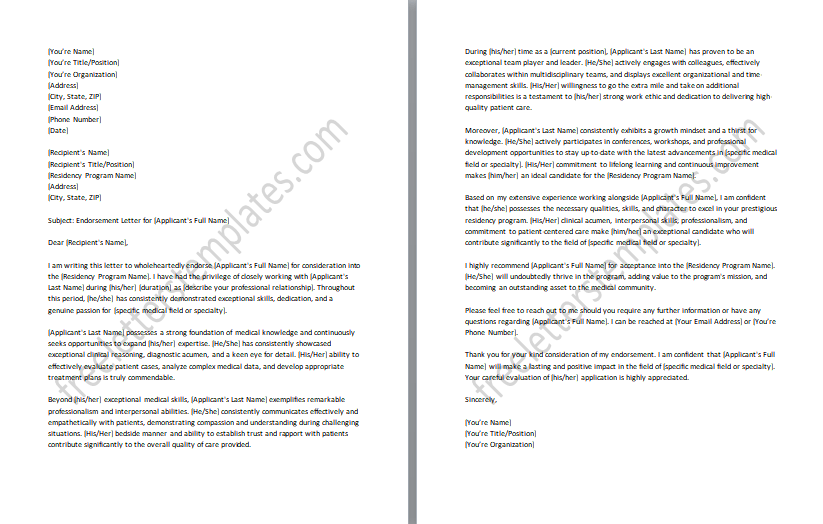
#3: Medical Employment Professional Reference
A professional reference letter for medical employment serves as a recommendation and validation of an individual’s qualifications, skills, and suitability for a medical job position. Typically written by a supervisor, colleague, or mentor who has worked closely with the individual, this highlights their clinical expertise, professionalism, work ethic, and interpersonal skills. It aims to support the candidate’s application, strengthen their credibility, and differentiate them from other applicants. Ultimately, this helps the candidate stand out as a strong candidate for medical employment and increases their chances of securing the desired job opportunity.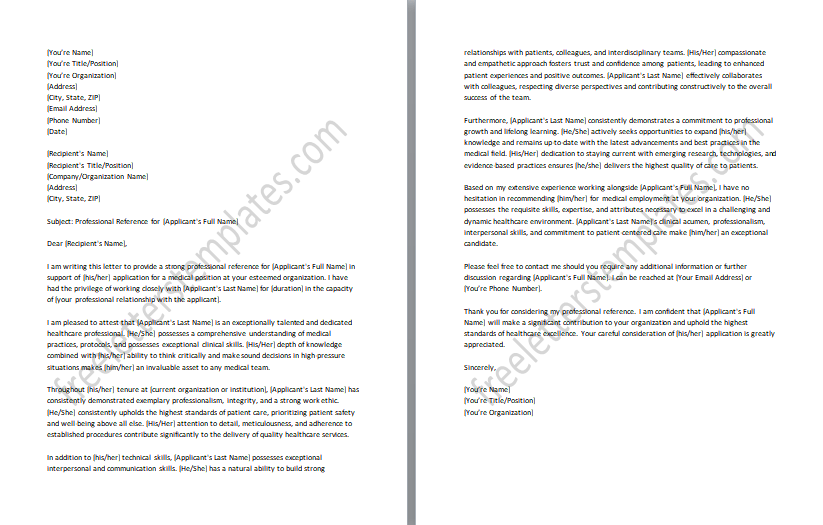
#4: Medical Field Fellowship Application Support
A fellowship application support letter for the medical field serves as a strong endorsement and backing for an individual’s pursuit of a fellowship opportunity. Typically written by a mentor, supervisor, or faculty member who is familiar with the applicant’s qualifications and aspirations, this highlights the applicant’s exceptional skills, knowledge, research abilities, and dedication to advancing in their medical specialty. It aims to support the applicant’s application, enhance their credibility, and increase their chances of being selected for the prestigious fellowship opportunity they are seeking.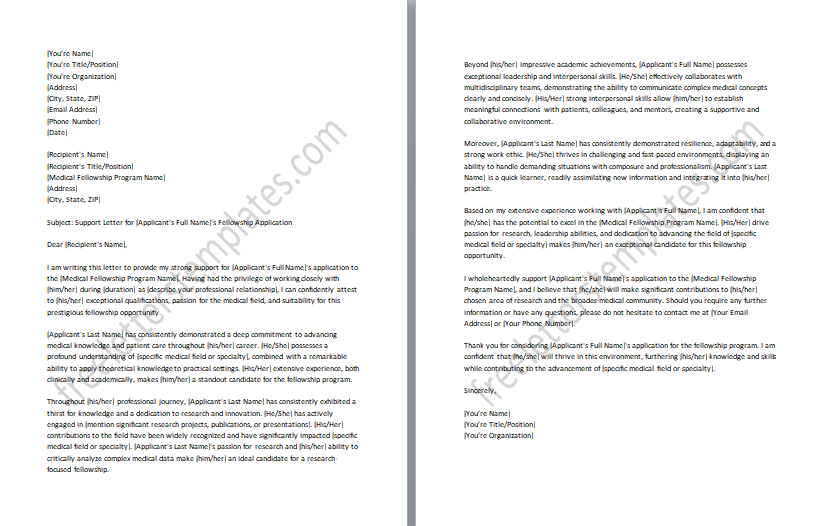
#5: Medical Purposes Immigration Support
An immigration support letter for medical purposes is written to provide support and advocacy for an individual’s immigration application, specifically related to medical reasons. This letter is typically written by a healthcare professional, such as a physician or medical specialist, and it outlines the medical condition or treatment needs of the individual that requires immigration for accessing necessary medical care. The letter aims to support the individual’s immigration application by presenting a strong case based on medical grounds and the urgent need for specialized medical attention, thus increasing their chances of obtaining the necessary immigration status for medical purposes.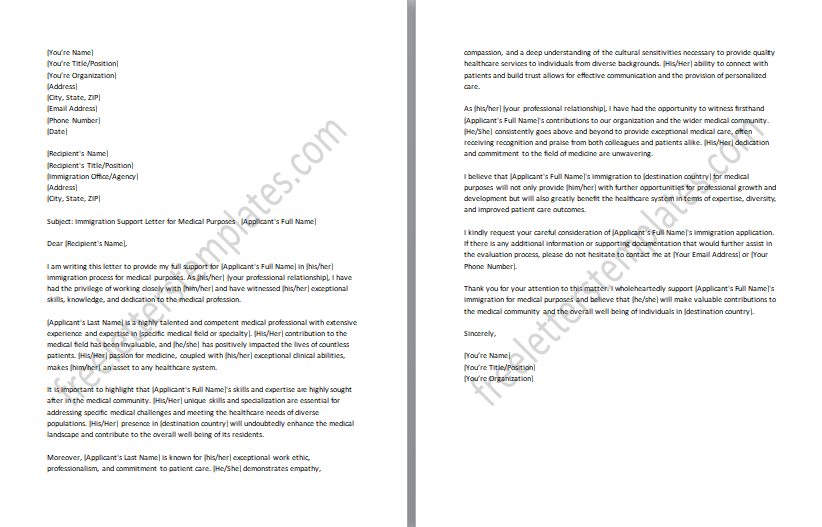
#6: Recommendation for Medical Research Opportunity
A letter of recommendation for a medical research opportunity serves as a strong endorsement and recommendation for an individual’s involvement in a medical research project or opportunity. The purpose of this is to provide valuable insights into the applicant’s research abilities, academic achievements, and commitment to scientific inquiry. It aims to support the applicant’s application, strengthen their credibility as a researcher, and increase their chances of being selected for the desired medical research opportunity. Ultimately, this helps the applicant stand out as a strong candidate and reinforces their potential for making significant contributions to the field of medical research.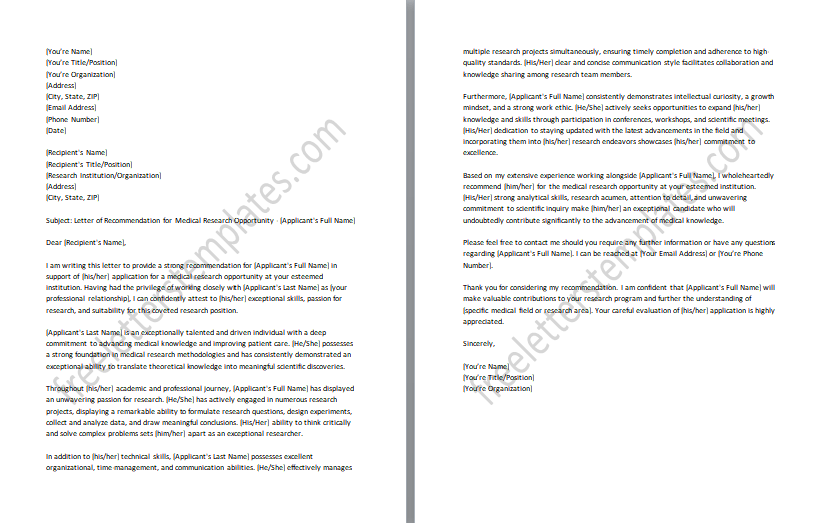
#7: Medical Graduate Program Academic Reference
An academic reference letter for a medical graduate program is a comprehensive endorsement of an individual’s academic qualifications and potential. It highlights their achievements, research skills, and commitment to medicine. The purpose is to provide insights to the admissions committee. It supports the application, strengthens candidacy, and increases the chances of acceptance. This is crucial for presenting the applicant as an exceptional candidate for medical education and professional growth.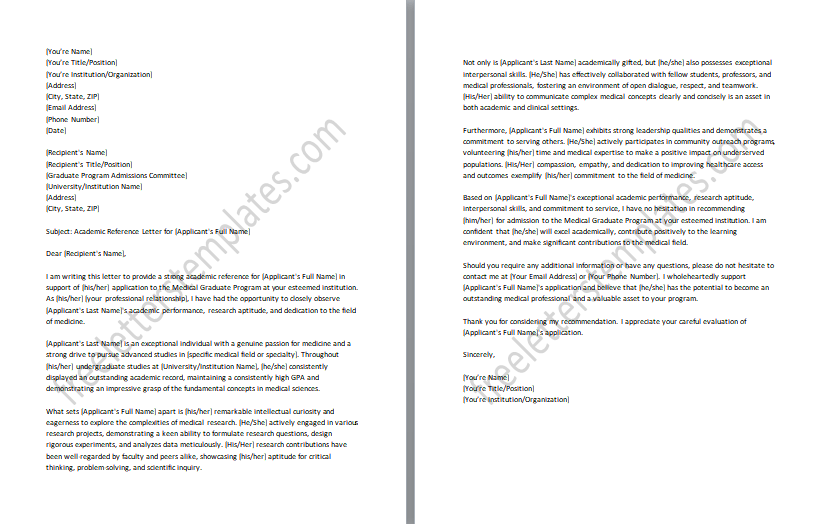
#8: Volunteer Program Recommendation for Medical Services
A volunteer program recommendation for medical services is a letter that strongly endorses an individual’s suitability and qualifications to participate in a volunteer program related to medical services. The letter highlights the applicant’s skills, experience, and dedication to serving in the medical field. Its purpose is to provide valuable insights to the program organizers, supporting the applicant’s application and increasing their chances of being selected. This is crucial in presenting the applicant as a strong candidate who will make a positive impact and contribute meaningfully to the volunteer program’s medical services.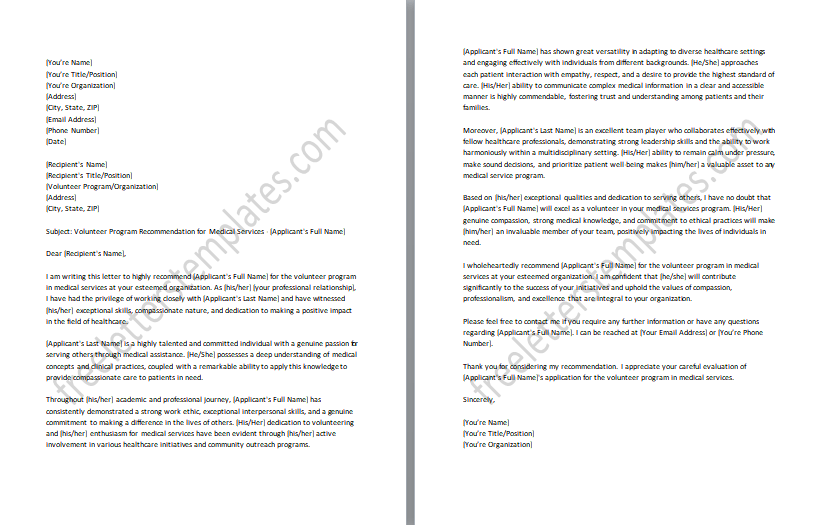
#9: Nursing School Admission Endorsement
A nursing school admission endorsement letter is a powerful recommendation and support for an individual’s application to nursing school. The letter highlights the applicant’s qualifications, skills, and dedication to the nursing profession. Its purpose is to provide valuable insights to the admissions committee, endorsing the applicant’s suitability and potential for success in nursing school. This aims to strengthen the applicant’s application, validate their qualifications, and increase their chances of being admitted to the desired nursing program. Ultimately, it presents the applicant as a strong candidate who possesses the necessary qualities to excel in nursing school and make a positive impact in the field of nursing.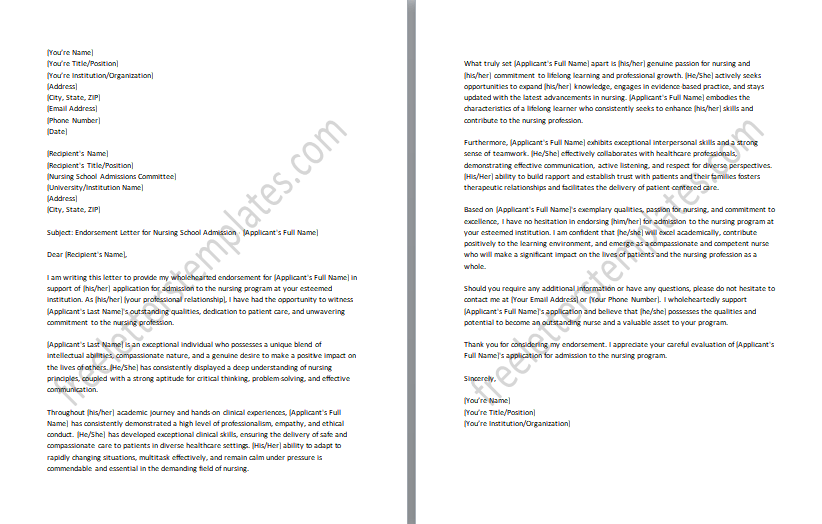
#10: Medical Assistant Position
A letter of recommendation for a medical assistant position is a strong endorsement of an individual’s qualifications, skills, and suitability for the role of a medical assistant. The letter highlights the applicant’s clinical knowledge, technical skills, professionalism, and interpersonal abilities. Its purpose is to provide valuable insights to the hiring manager or employer, endorsing the applicant’s capabilities and potential for success in the medical assistant position. This aims to support the applicant’s application, strengthen their credibility, and increase their chances of being selected for the desired position. Ultimately, it presents the applicant as a competent and dedicated medical assistant who will contribute positively to the healthcare team and provide excellent patient care.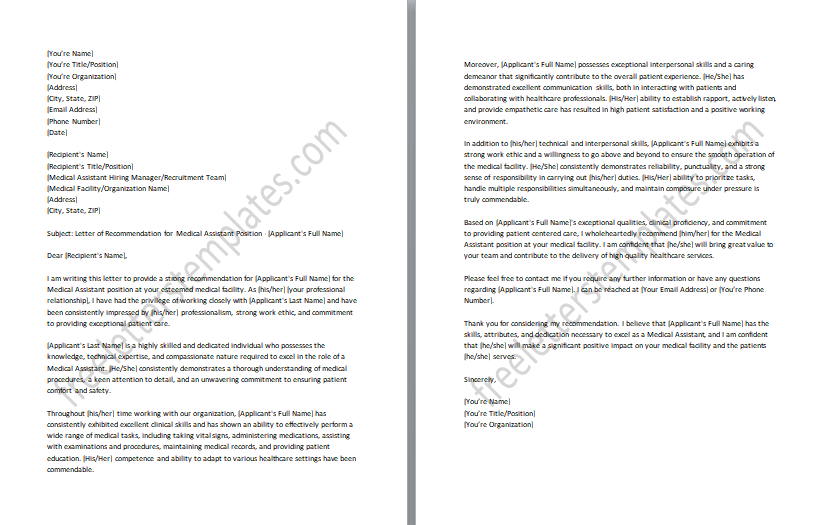
#11: Pharmacy School Application Support
A pharmacy school application support letter is a valuable endorsement of an individual’s qualifications, academic achievements, and commitment to the field of pharmacy. The letter provides support for the applicant’s application to pharmacy school by highlighting their strong academic performance, relevant experiences, and passion for pharmacy. It aims to provide the admissions committee with insights into the applicant’s potential as a future pharmacist, their dedication to patient care, and their ability to contribute to the field. Ultimately, this enhances the applicant’s chances of being accepted into pharmacy school by presenting them as a highly qualified and deserving candidate.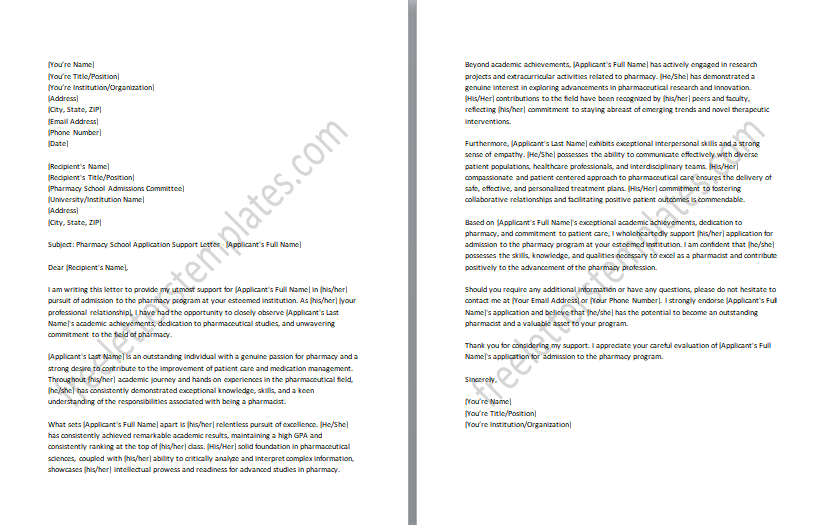
#12: Medical Technician Job Reference
A medical technician job reference letter serves as a valuable endorsement of an individual’s qualifications, skills, and suitability for a medical technician position. Its purpose is to provide valuable insights to the potential employer, endorsing the applicant’s capabilities and potential for success in the medical technician role. This aims to support the applicant’s job application, strengthen their credibility, and increase their chances of being selected for the desired position. Ultimately, it presents the applicant as a competent and reliable medical technician who will contribute effectively to the healthcare team and ensure the smooth operation of medical procedures and tests.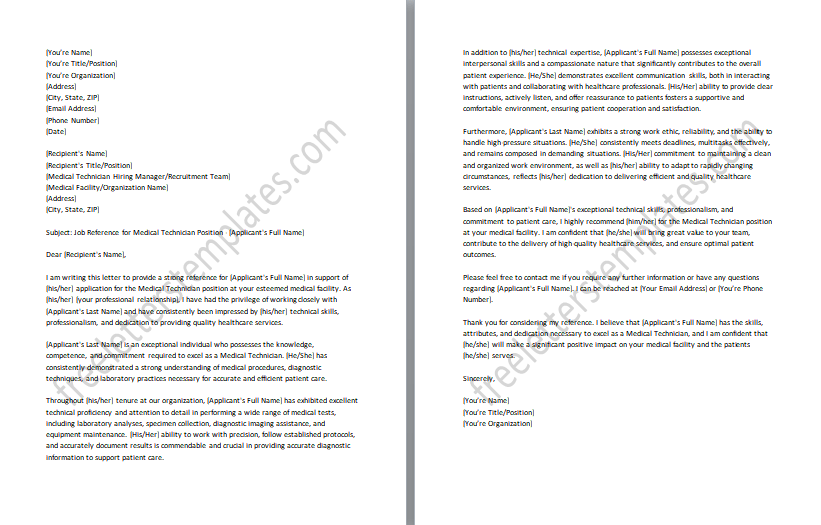
#13: Physician Assistant Program Endorsement
A physician assistant program endorsement letter is a strong recommendation and support for an individual’s application to a physician assistant program. The letter highlights the applicant’s qualifications, clinical skills, compassion, and dedication to patient care. Its purpose is to provide valuable insights to the admissions committee, endorsing the applicant’s potential as a future physician assistant. This aims to strengthen the applicant’s application, validate their qualifications, and increase their chances of being accepted into the desired program.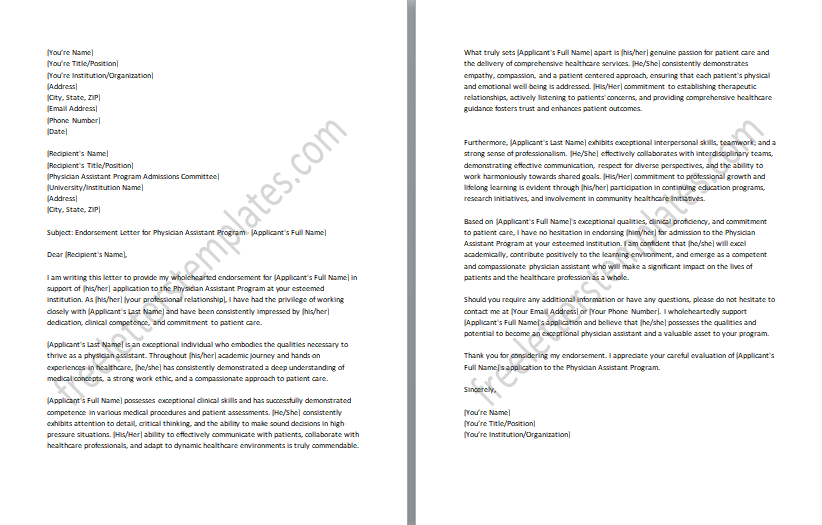
#14: Medical Billing and Coding Position
A letter of recommendation for a medical billing and coding position is a strong endorsement of an individual’s qualifications, skills, and suitability for the role. The letter highlights the applicant’s knowledge of medical coding systems, attention to detail, accuracy, and ability to handle confidential patient information. Its purpose is to provide valuable insights to the hiring manager or employer, endorsing the applicant’s capabilities and potential for success in the medical billing and coding field. This aims to support the applicant’s job application, strengthen their credibility, and increase their chances of being selected for the desired position. Ultimately, it presents the applicant as a competent and reliable professional who will ensure accurate billing and coding processes, contributing to efficient healthcare operations and financial integrity.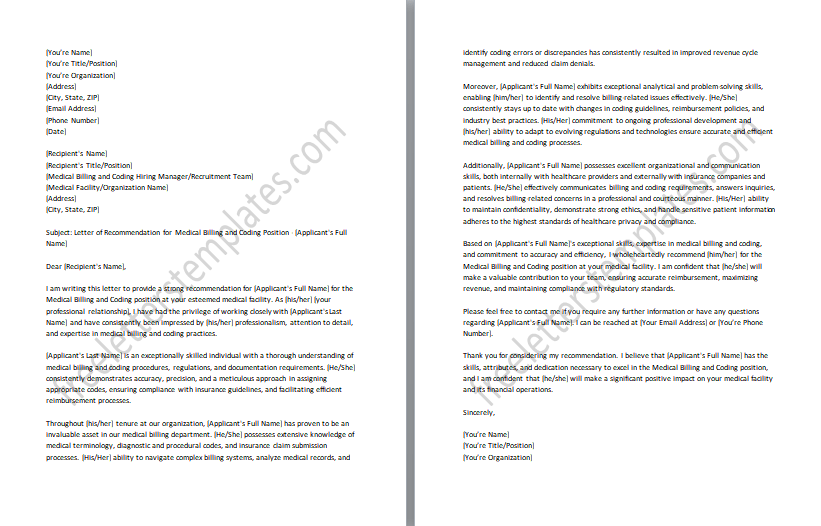
#15: Physical Therapy School Application Support
A physical therapy school application support letter is a valuable endorsement of an individual’s qualifications, passion, and suitability for admission to a physical therapy program. The letter highlights the applicant’s academic achievements, clinical experiences, interpersonal skills, and commitment to the field of physical therapy. Its purpose is to provide valuable insights to the admissions committee, supporting the applicant’s application and increasing their chances of being accepted into the desired program. This aims to portray the applicant as a dedicated and capable individual who possesses the necessary skills to excel in the field of physical therapy.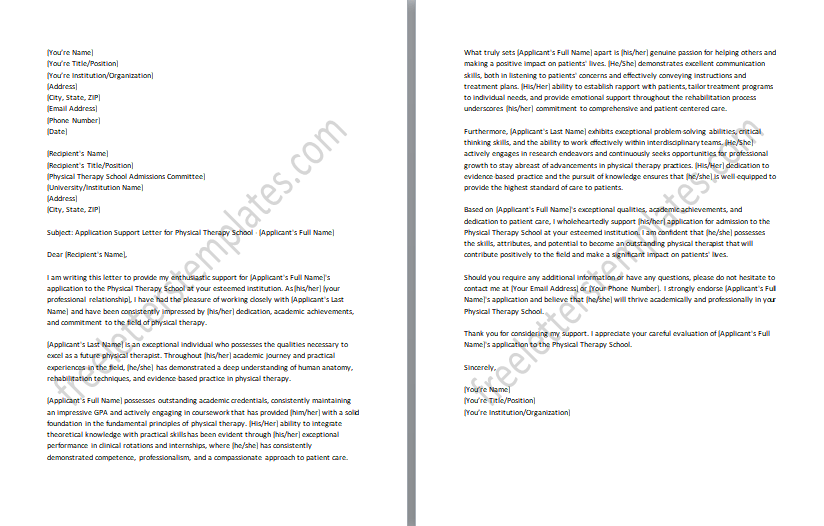
#16: Medical Administration Position Reference
A medical administration position reference letter is a strong recommendation and support for an individual’s qualifications, skills, and suitability for a medical administration role. The letter highlights the applicant’s knowledge of healthcare administration, organizational abilities, communication skills, and attention to detail. Its purpose is to provide valuable insights to the potential employer, endorsing the applicant’s capabilities and potential for success in the medical administration position. This aims to support the applicant’s job application, strengthen their credibility, and increase their chances of being selected for the desired position. Ultimately, it presents the applicant as a competent and efficient medical administrator who will contribute effectively to the smooth operation of healthcare facilities and ensure high-quality administrative support.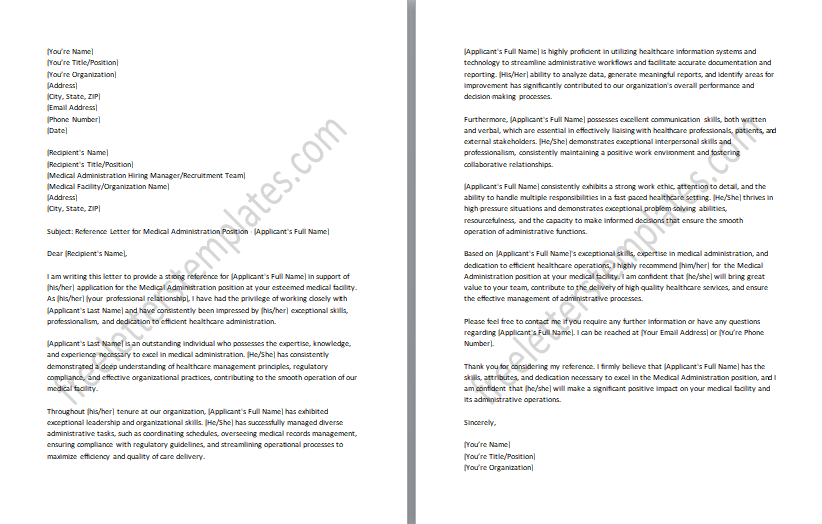
#17: Dental School Admission Endorsement
A dental school admission endorsement letter is a powerful recommendation and support for an individual’s application to dental school. The letter highlights the applicant’s academic achievements, clinical skills, dedication, and passion for dentistry. Its purpose is to provide valuable insights to the admissions committee, endorsing the applicant’s qualifications and potential for success in dental school. This aims to strengthen the applicant’s application, validate their capabilities, and increase their chances of being accepted into the desired dental program. Ultimately, it presents the applicant as a competent and compassionate future dentist who will contribute positively to the field of dentistry and provide exceptional dental care to patients.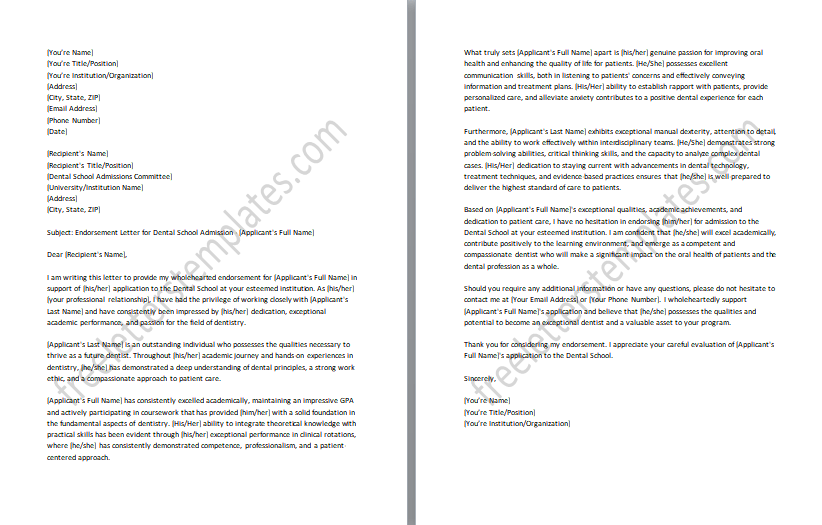
#18: Medical Transcriptionist Job Reference
A medical transcriptionist job reference letter is a strong endorsement of an individual’s qualifications, skills, and suitability for a medical transcriptionist position. The letter highlights the applicant’s proficiency in medical terminology, attention to detail, accuracy, and ability to transcribe medical records efficiently. Its purpose is to provide valuable insights to the potential employer, endorsing the applicant’s capabilities and potential for success in the medical transcriptionist role. This aims to support the applicant’s job application, strengthen their credibility, and increase their chances of being selected for the desired position.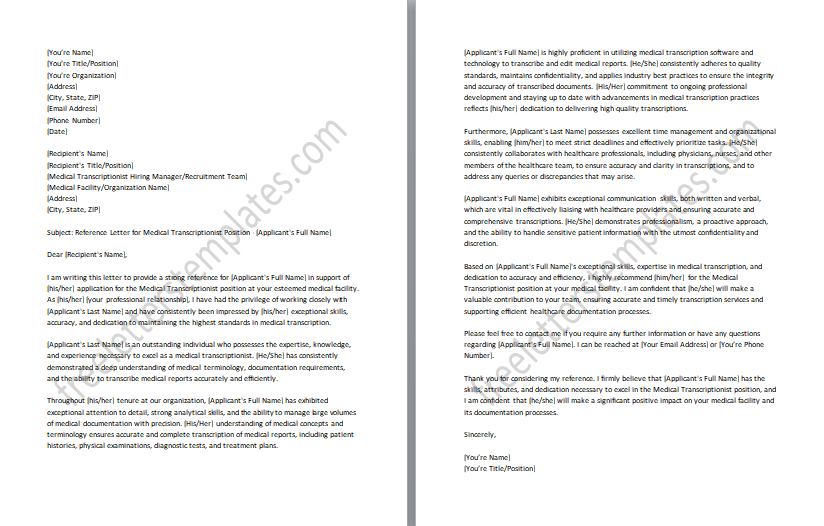
#19: Occupational Therapy Program Support
An occupational therapy program support letter is a valuable endorsement and recommendation for an individual’s application to an occupational therapy program. The letter highlights the applicant’s academic achievements, clinical experiences, interpersonal skills, and passion for occupational therapy. This aims to present the applicant as a dedicated and compassionate individual who possesses the necessary skills to excel in the field of occupational therapy. Ultimately, it portrays the applicant as a strong candidate who is committed to helping individuals regain independence and improve their quality of life through occupational therapy interventions.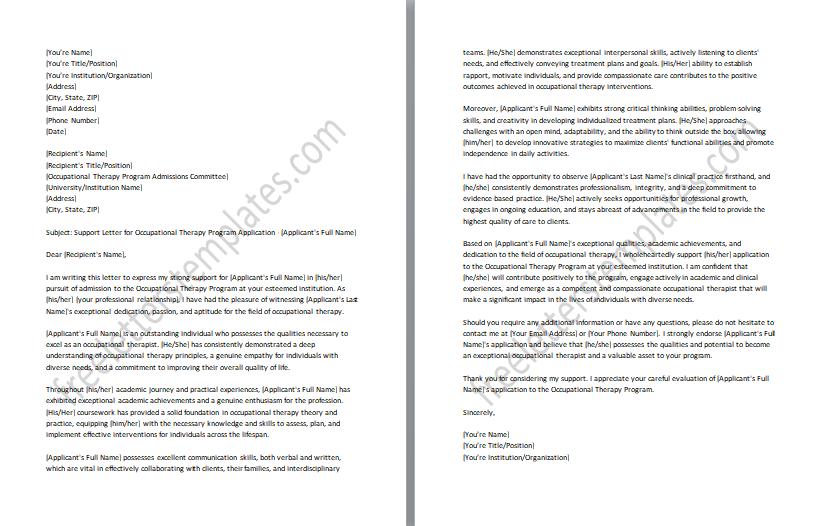
#20: Medical Sales Representative Role
A letter of recommendation for a medical sales representative role is a strong endorsement of an individual’s qualifications, sales skills, and suitability for the position. The letter highlights the applicant’s knowledge of medical products, communication abilities, sales achievements, and customer relationship management skills. Its purpose is to provide valuable insights to the hiring manager or employer, endorsing the applicant’s capabilities and potential for success in the medical sales representative role. This aims to support the applicant’s job application, strengthen their credibility, and increase their chances of being selected for the desired position.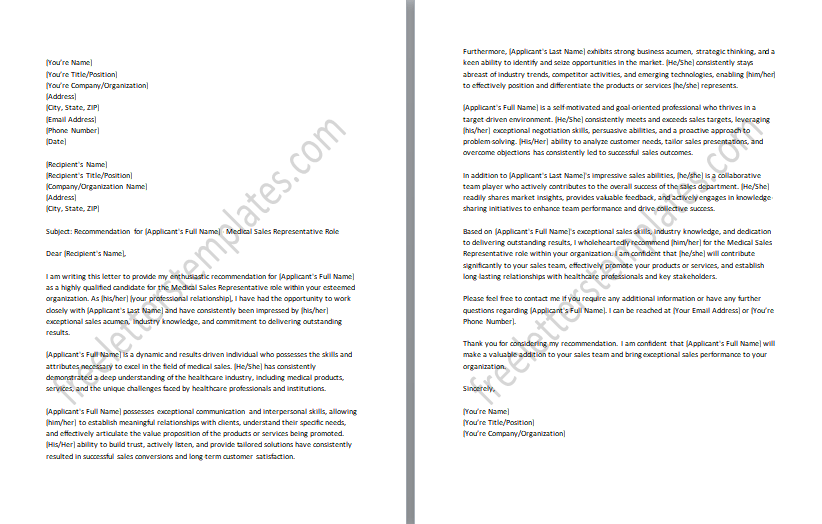
#21: Radiology Technician School Application Endorsement
A radiology technician school application endorsement letter is a powerful recommendation and support for an individual’s application to a radiology technician program. The letter highlights the applicant’s academic achievements, technical skills, attention to detail, and passion for radiology. Its purpose is to provide valuable insights to the admissions committee, endorsing the applicant’s qualifications and potential for success in the radiology technician field. This aims to strengthen the applicant’s application, validate their capabilities, and increase their chances of being accepted into the desired program. Ultimately, it presents the applicant as a competent and dedicated future radiology technician who will contribute to accurate diagnostic imaging, patient care, and the overall healthcare team.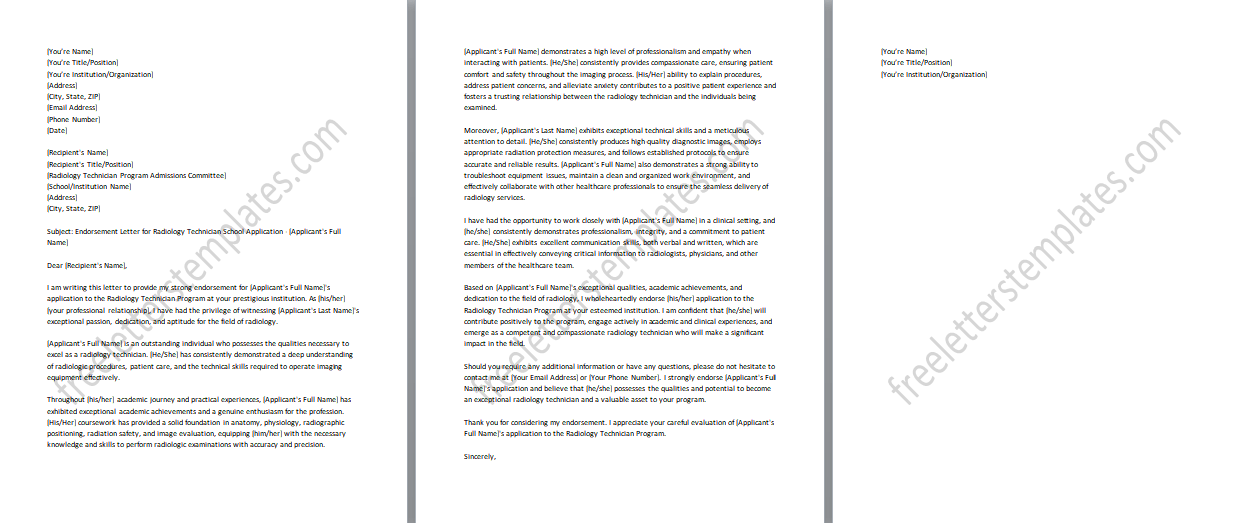
Etiquette and Professionalism
Maintaining professionalism and adhering to ethical guidelines is crucial when it comes to writing or requesting reference letters in the medical field. Here’s why etiquette and professionalism matter and how to approach the process with integrity and respect:
- Preserve Confidentiality: Respect the confidentiality of the information shared with you. Handle sensitive details and personal information with utmost care and ensure that the content of the reference letter remains confidential. Seek the applicant’s consent before sharing the letter with anyone else.
- Provide Accurate Information: Ensure that the information you provide in the reference letter is accurate and truthful. Do not exaggerate or fabricate the applicant’s qualifications, experiences, or achievements. Stick to the facts and present an honest assessment of their abilities.
- Maintain Professionalism in Tone: Use a professional and respectful tone throughout the reference letter. Avoid any inappropriate or derogatory language that may undermine the credibility of the letter. Keep the focus on the applicant’s strengths and qualifications.
- Avoid Conflicts of Interest: If you have any personal or professional conflicts of interest that could compromise the objectivity of the reference, it is best to decline the request. It is essential to provide an unbiased and impartial assessment of the applicant’s qualifications.
- Follow Guidelines and Deadlines: Adhere to any guidelines or instructions provided by the recipient of the reference letter. Pay attention to deadlines and submit the letter in a timely manner. Failing to meet deadlines or disregarding specific requirements can reflect poorly on your professionalism.
- Seek Consent and Provide Updates: Before writing a reference, seek the applicant’s consent to ensure they are comfortable with you providing a reference on their behalf. Throughout the process, keep the applicant informed about the progress and any relevant updates.
- Respond Promptly and Professionally: If you are requested to write a reference letter, respond to the request in a timely manner. Even if you are unable to provide a reference, communicate your decision respectfully and promptly. Avoid leaving the requester waiting for a response.
- Respect Requested Limitations: If the applicant requests specific limitations or preferences for the reference letter (such as not mentioning certain experiences or personal information), honor those requests to the best of your ability. Respect their privacy and ensure you are in alignment with their wishes.
- Express Gratitude: If you are the recipient of a reference letter, express your gratitude to the recommender for their time and effort. A thank-you note or email shows your appreciation for their support and reinforces a positive professional relationship.
Concluding Thoughts
In conclusion, Medical Reference Letters serve as powerful tools in the medical field, shaping the trajectory of individuals’ careers, educational pursuits, and professional growth. These carry significant weight in applications, admissions, employment opportunities, and networking endeavors. By providing comprehensive insights into an individual’s qualifications, character, and potential, reference letters enhance credibility, foster positive reputations, and open doors to new opportunities. It is important to approach the process of requesting and writing reference letters with professionalism, integrity, and respect, ensuring accurate information, adhering to ethical guidelines, and maintaining confidentiality. By harnessing the potential of reference and navigating the process with care, individuals can leverage the support and endorsement of respected professionals to make a lasting impact in the dynamic and rewarding field of medicine.